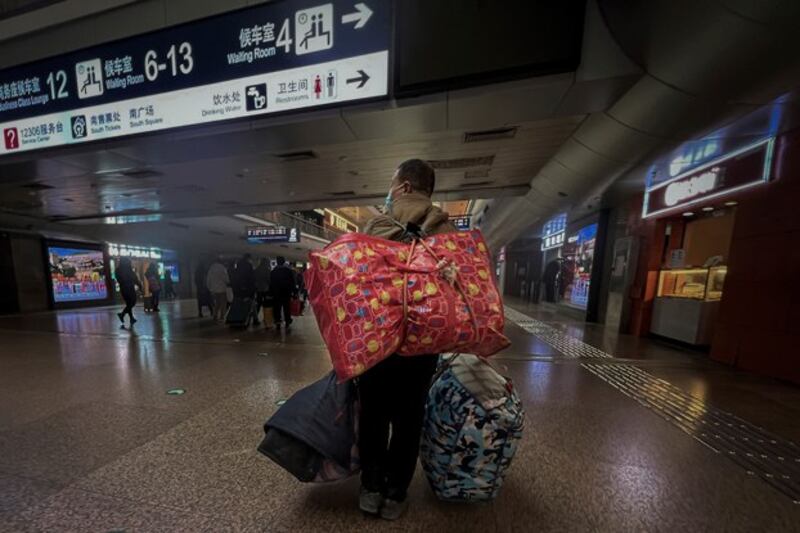China's army of migrant workers has been hit hard by the economic downtown, with many citing a wave of bankruptcies, factory closures and mass layoffs, telling Radio Free Asia in recent interviews that jobs are getting harder and harder to come by, as wages shrink.
Despite reassuring claims of modest economic recovery from the ruling Chinese Communist Party leadership in Beijing, the struggling economy has left employers and governments unable to pay wages, or forced companies to shut down facilities and lay off staff.
All of that comes at a time when China's hundreds of millions of migrant workers might normally be hoping to earn some extra cash ahead of the Lunar New Year festivities in February.
"There are so many people out of work," one unemployed worker in his twenties who gave only the nickname Marginalized Mainlander said in a recent interview with RFA.
"This only started happening this past year," said the man, who has moved from city to city looking for construction work, and is now camped out in the workplace dormitory of an employed friend.
"A while back, it used to be so easy to find construction work," he said, adding that he had tried driving for a ride-hailing service in Shanghai, but gave up after he did the math.
"I was driving 12-hour shifts, and only making 280 yuan [US$39]," Marginalized said, adding that he and other drivers would sleep in their car for days on end to save on time and expenses. "I needed to make more than 300 just to break even."
After a few days, he quit the app, losing all of his deposit in the process.
"There were a lot of other people in the same boat," he said.
Marginalized said he would give it another couple of weeks, then head back to his hometown in rural Guangdong province if nothing turned up.

He's not the only one struggling.
June figures from China's National Bureau of Statistics showed a more than 21% unemployment rate among the country's 18-24 year-olds, a statistic that has since withdrawn for review, according to officials.
In July, Peking University scholar Zhang Dandan published a study showing that if all the young people who have moved back into their parental home to "lie flat" were counted, the March figure would be closer to 46.5%.
Meanwhile, new housing construction figures have taken a nosedive, falling by 21.2% from January through November, implying far fewer jobs for migrant workers to chase.
Manufacturing sector layoffs
It's a similar story in manufacturing.
Twentysomething Zhang Wei was laid off from his job at an electronics factory in June, and has been unemployed ever since.
The factory, based in the central city of Wuhan, had once made parts for Samsung mobile phones, but the orders were drying up, and only three out of its four production lines were operational at the time he was let go, said Zhang, who also asked to be identified by a pseudonym.
Zhang, who has a college degree, used to carry out quality inspections of smartphone screens, a skilled job.
"The problem is that the new workers coming in are cheaper," he said. "The electronics factory leadership were inhumane."
"They talk about high wages when they recruit you, but once you're in, it's different," Zhang said, in a reference to the labor agencies that typically recruit migrant factory workers. "They can fire you just like that."
"There are too many people unemployed, and you can't get a job just for the asking," he said, adding that this year has been the worst he has known, with agencies undercutting his requested salary by up to 20%.
He said the 4,000 yuan, or US$560, he was recently offered just isn't enough to make work, which he likened to prison labor, worthwhile.
"Who would want to go to prison for 4,000 yuan a month?" Zhang said. "Your hands never stop, you have to sit upright, and they report everything you do -- what's that if not a prison?"
Even more privileged white-collar workers are feeling the pinch this winter.

A state-sector computer systems analyst who gave only the nickname Pikachu for fear of reprisals said he has applied for jobs as wide-ranging as community grid worker, hospital IT specialist, and even student counselor at a university since quitting his job due to family circumstances.
"I went to apply for a community grid worker job a couple of days ago," he said. "They were looking to recruit 15 people, and when I went to take the exam, more than 1,000 applicants showed up."
Pikachu has been actively sending out resumes, but says he rarely hears back from anyone. He is also considering taking the civil service exams, but that route into a safe official job is now also massively oversubscribed.
"Five times oversubscribed," he said. "A lot of people sign up to try their luck, even if they don't meet the recruitment criteria."
And there is likely no way back to his former job, either.
"I heard that at least half of the employees will be laid off," he said, citing rumors from former colleagues.
As young men, Zhang, Pikachu and Marginalized aren't even among the most marginalized in the Chinese labor market. Women and people over 35 are likely to struggle even more than they do with job-hunting in the current climate.
Bosses clear out
China's former factory and company bosses, meanwhile, are shutting up shop, with many leaving the country in the wake of the zero-COVID restrictions, citing a deteriorated political situation under Chinese Communist Party leader Xi Jinping.
Ren Xiaoyao has spent the last five years in a controlled shutdown of his three real estate companies, laying off more than 200 employees in the process, many of whom have since struggled to find work.
"They're pretty skilled, but only a few found jobs, and even those found they could only get one-third of their original salary," Ren, who gave a pseudonym for fear of reprisals, told RFA from his new home in North America.
He said he left China "because Xi Jinping wanted to be an emperor," in a reference to Xi's abolition of presidential term limits and ongoing moves to concentrate executive power in his own hands in recent years.
"When he put [the abolition of term limits] on the agenda, I decided to shut down all of my China businesses," Ren said.

Fellow entrepreneur Cai Shenkun said his company is suffering from Xi's moves to enlarge and enrich the state sector at the expense of private companies, which once accounted for around 80% of jobs in the Chinese economy, according to official figures.
"State-owned enterprises lead the bidding for major projects, so companies like ours are gradually being shut out of the industry," said Cai, who runs a smart-lock identification tech company and is a prominent blogger and current affairs commentator.
"State-owned companies have basically taken a dominant position."
Cai has been planning to shutter his company for three years, but has hesitated because his employees have nowhere else to go.
"I am encouraging them to find other jobs, but they haven't yet, and they are still there," he said. "I keep telling them they can leave any time because there's no more business."
Eventually, Cai expects the firm to go under next year, like many others in the sector.
"Some of my friends' companies used to be very big, but now they've basically stopped or reduced production," he said. "They don't think they'll survive — it's a very common phenomenon."
Going out of business
While official figures pointing to economic damage are hard to find, due to the government's insistence on positive news about the economy, the financial website Titanium Media recently reported that some 90% of companies in the chip industry had gone out of business during the course of 2023.
Thousands of rural tourism businesses have also gone out of business, according to a report in The Paper, while industrial profits fell by 7.8% and the average number of employees in listed companies fell by 12% between 2018 and 2022, according to government figures.
While Cai and Ren have no plans to go back to China, Marginalized, Zhang Wei and Pikachu have little choice but to try to weather the economic gloom.
"If I have no money, people will look down on me," said Zhang, who dare not go home yet. "I don't know how I'm going to survive this winter."
Translated by Luisetta Mudie . Edited by Roseanne Gerin.
